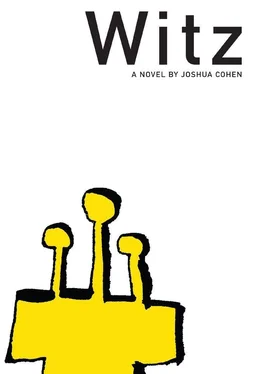Dinner! Hanna shouts, Wanda echoing her way upstairs-upstairs, in that accent of hers fearsome, and yet so endearing her to the kinder flooding their ways down the stairs screaming:
Dinner.
Dinner.
Dinner.
Dinner.
Dinner.
Dinner…
one flight from rooms the floors of which angels and archangels bump their halos and heads upon if heads or halos they have. The stairs take their feet, as if the bent backs of older guests — the Singers hunching their ways to the table, each being the other’s crutch. Batya, the last one though nearest the diningroom, stumbles in from the room living, family, den, her eyes smiling through sniffle, her mouth shaped as if the last teardrop, toothless. Israel blesses her nose wiped with a tablecloth corner, kisses her head; Hanna sighs. Tonight is one of the last dinners — one of the last linners or dunches, not many more of them left, combinations, recipes of the blend, before meals vomit themselves into omnipresence, that voraciously forever cyclical course; into our eating and drinking through not just an appetizer or entrée to late time — as if the arrivals, the youngest the latest among them, were afraid they’d missed everything with even dessert already served until Hanna had said and loudly what would sound like the name of a God and then in that accent of Wanda’s that renders everything foreign and so authoritative, such sense of importance mitigated only in its echo of echoes amid the high giddy swoops of the girls: they’re so excited, forgive them, it’s almost as if they, the guests, had been early or punctual after all; though it’s not them that’s been so long expected, their company, conversationally muktzah their dwelling on business and workaday cares, it’s what their presence finally, ultimately, means to them, to the daughters: the dinner, the dinner, THE dinner…
Hanna turns to straighten Israel’s tie he’s still in, the same tie from the day’s suit retained — to tuck it under a collar again, button it in again, tighten; he holds her hands in his to resist.
How thoughtful, she thinks, he’s wearing it for his partner: set an example, if you love him so much…
There’s a great gathering at table, each to a place and its set — every meal’s mishegas at their settling.
Cork, who has the cork? they ask.
I want to smell the cork, I want to taste it, to suck.
Israel raises his cup and remembers: first to wash ’n’ dry, to bless the bread he’d bought not an hour previously, half that, broken into two loaves and covered over then uncovered and blessed — kneaded asunder, they’ve risen to the occasion, so high. She didn’t bake? rise newly arrived eyes around the table, again, mouthy whispers falling silent, assuring: she didn’t bake. Salt then dinner ensues now with talk, the stir of the soup, conversation never indexed under any number Oxyrhynchus, as it’s all too well known. Why? Save your questions to sweeten the coffee, the weakening steep of the tea. Because everything can’t be forgotten, that’s why we remember, and anyway, guests, they shouldn’t ask too many questions, am I right…be pleasant, host polite, elbows off the table, shoulders straight, no fulling while your mouths talk to rumor, to gossip, or talking to answer while your mouth’s full, I mean — you come from a good family, they can tell…the Who’s? maybe…O any relation to the who’s on the Mainline, of one of the Five Towns, figuring that’s a twenty percent shot, odds are you’re favored? what street, what number, asking, just asking, a daughter’s at, hymn, and a son who’s her husband, the Muttershtups, the Ladlefarts him the surgical judge how he does operations on minorities at risk and for nothing, takes requests, no, on second thought maybe you wouldn’t, but at least you brought a bottle, how thoughtful, how kind, a few flowers for her, a bouquet of bees, an arrangement: isn’t it about time you got married, and so maybe you’d bring your kinder, too, if you have them the two of you you’re so cute together or if not, next time, then what’re you waiting for?
Tonight, and all the Fridays are the same, and how that’s the idea, one of the guests, Feigenbaum his name, head tenderized, rendered as soft as his heart’s always been from his entrance through the oven, shifts uncomfortably in his chair, scoots, scooches, moves himself bald with his seat, shoots glances left, right, then across the table, excuses himself in a voice too soft and unsure to hear or truly know if he excuses himself or not with even him still unsure and so maybe he didn’t, rising, wending his way around his own chair then past those of the others, nimbly, squeezing himself as if greased with the essence of the fish and the chicken to follow through the small occasional apertures appearing between chairs and wall, knocking the hands of dim clocks to chaos and photographs and art, too reluctant and ashamed, too, to ask the seated to pull or push their chairs in a bit, a bissel and so generally upsetting all their eating and drinking and talking even more than if he would’ve asked to be disregarded politely to begin with.
This is his third trip to the bathroom this meal, though this one, and though he’s thought this every time, is no False Alarm. A ringing in the crotch, this bowelward tingle. The trouble is twofold, as it always is, if not morefold, brokenloaved, turning cheeked: one, his bladder, the second, his memory. Or. Though he’s been there twice already tonight, or has it been thrice, he has no idea, for the life of him, no memory whatsoever, of where exactly which bathroom is. Maybe it’s the medication is the easy way out — which leads I don’t know, wish I did. He’s not even sure he went to the same one the two times previous. It’s quite possible he’ll spend time in three different bathrooms tonight — if he doesn’t have to go again, the odds of which aren’t in anyone’s favor: the plumbing and paper supply. Even given the number, not to mention the aesthetic variety, of bathrooms in this house, those options of memory wellventilated, overlit, he still has no idea where the gehenna any of them are. And how to ask for help, for direction. At least, he had his dignity earlier. He’ll find it himself, don’t you mind.
He wanders, quickly now, holding it in, cupping his cheeks, bunching his pants up. A left here and right there, the way the light fell anywhere, and the darkness. That particular wallhanging, print, or mirror. The carpet giving way to tile, or was it a woodfloor, or rug pulled out from below, and if rug then a rug patterned how, over what — wandering into a part of the house he probably hasn’t or doesn’t think he’s ever been in before, maybe a portion that didn’t even exist prior to his wandering it, an annex, extension. Inscrutable. Obscure. He’s feeling for walls, his hands held out to ascertain distances, depths, pushing against the leaning, the pitching hallway, feeling for openness and passages, cavities, cancerous abcesses, pressing turns and doors and deadends. Respiratory difficulties. Senility. Alzheim, I forget. He fumbles with handles, knobs, trips over thresholds, his feet snag on rugs, snare on throw-rugs, nearly toppling honorary plaques and trophies from pedestals, then pausing to right them, pushing against and finally — his third bathroom of the night, a mistake; a door he didn’t mean to open but does, falls against it and there it, or only one of them, is.
He runs the tap to weather the sounds, shpritzes his wife’s, his Felice’s (there’s the name Israel’d forgotten, left in his other suit), less expensive perfume, stolen from home’s vanity and kept leaking in his jacket pocket, to create a cloud for the odor anticipated, then undoes himself, piles pants on the floor. He sits and waits, strains, tries; locked in with the running tap, the noxious atmospherics of imitation scent. Has he gone yet, hasn’t he — who wants to look, to hear, to smell. Not yet. Too pitiful, too embarrassed, to ask for help he sits and waits, taps shoes under his pants as if a stray calf ’s hidden down there and breathing. And he’s there next week, maybe, as if gestating, hibernative unasked after, never searched for or what, at least it seems that it’s his wife again his Felice eating her dinner, and drinking too much all over again, she’ll feel it in the morning in bed with a headache with me still bathroomed, locked in — her talking and always too huge with the wife of the household, not thinking to ask whether she, Hanna he’s searching for the name, knows where he, Feigenbaum, is; him hearing Hanna talking, talking, the woman’s always talking, to his wife just down the hall, the halls, the other guests, about the guests and his wife, about them to them, too, the preparation of food according to special diets, neighborhood tragedy weighed upon the Grecian scale — the walls shaking intestinally, the windows giving gaseous drafts; hearing what must be next week’s preparations in the hallways already, drawers opening, closing, and closets, he sits and waits, wetting wads of tissue, sucking them to formlessness, gumming the soap for his sustenance — they’ll forget about him, always do.
Читать дальше












